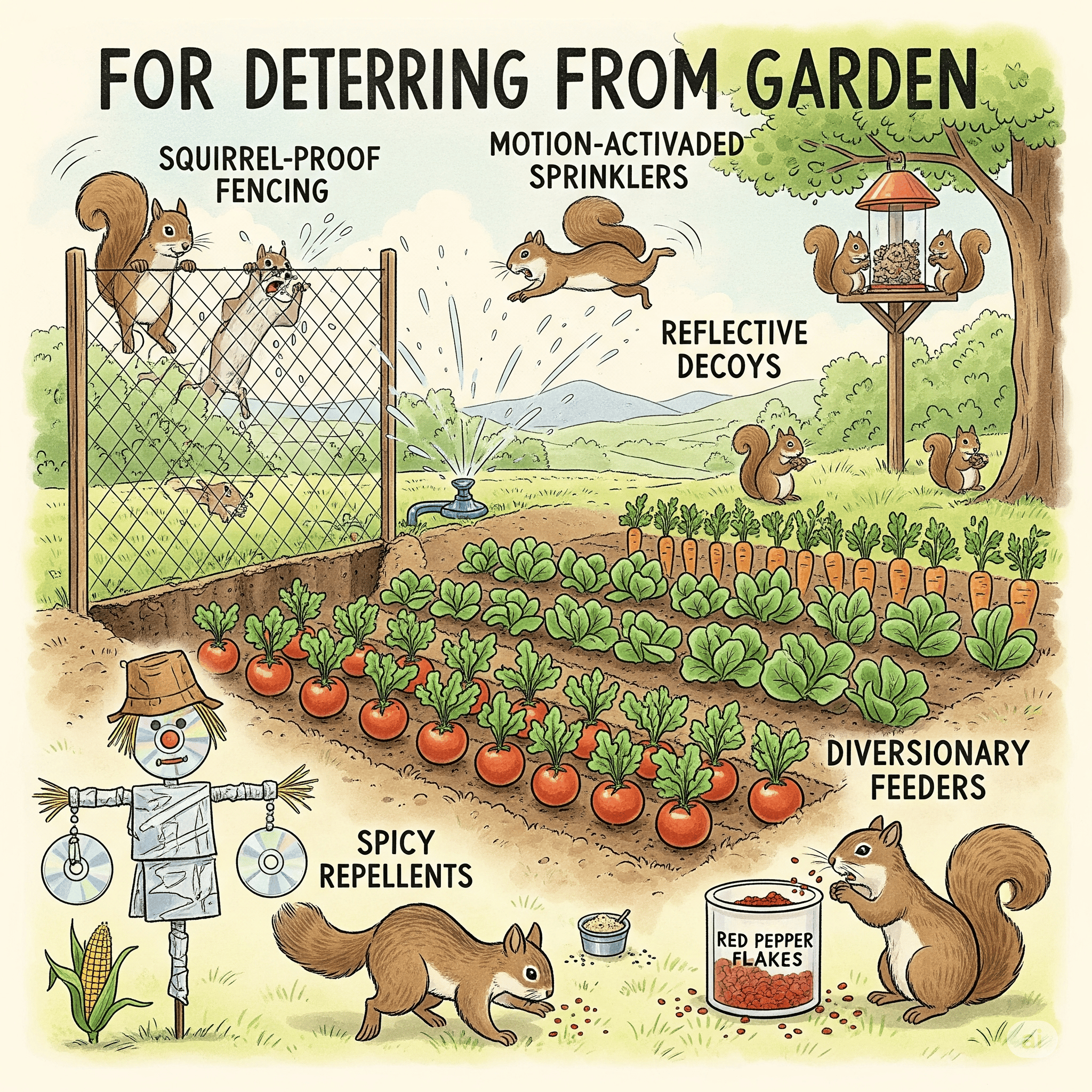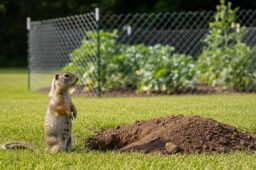How to Keep Squirrels Out of a Vegetable Garden (A Crop-by-Crop Guide)
- August 06, 2025
- by
- John Miller
Why Squirrels Target Vegetable Gardens Specifically
Squirrels don’t just visit gardens for fun. They come looking for food. Your garden is full of it—fresh vegetables, fruits, and even water after rain. Squirrels are clever and quick. They’ll bite tomatoes, dig up carrots, and steal corn right off the stalk. It’s not just about hunger. Sometimes, they’re storing food for later or just playing with it.
Your vegetable garden is like an open buffet to them. Tomatoes are juicy, corn is sweet, and beans are fun to yank off vines. So if you’re wondering, “Why do squirrels keep visiting my garden?” the answer is simple: it’s tasty and easy to reach.
The Best All-Purpose Solution: Building a Walk-in Garden Enclosure
If you want to stop squirrels completely, this is the best choice. A walk-in enclosure keeps squirrels out without harming them. It also keeps other animals away—like rabbits, raccoons, or birds.
Choosing Materials: Chicken Wire vs. Hardware Cloth
- Chicken Wire is cheaper and easy to work with, but it’s not strong enough for squirrels.
- Hardware Cloth is stronger. It has tiny holes, so squirrels can’t squeeze through or chew it.
For best results, use hardware cloth with ½-inch or smaller openings. Always choose galvanized material so it doesn’t rust.
Step-by-Step: Key Principles for a DIY Cage
- Frame it using wood or metal pipes.
- Cover all sides with hardware cloth—including the top.
- Bury the bottom edge at least 12 inches into the ground to stop digging.
- Use a lockable gate so you can walk in but squirrels can’t.
- Seal all gaps with zip ties or metal clips.
This may take some time to build, but once it’s done, your garden is protected year-round.
Protecting Individual Plants and Rows
Not ready to build a full enclosure? No problem. You can still protect your crops with smart, focused tricks.
How to Protect Your Tomato Plants from Squirrels
Tomatoes are a favorite for squirrels. They love taking just one bite and leaving the rest.
- Use tomato cages with netting around the plant.
- Place small wind spinners or reflective tape nearby. Squirrels don’t like sudden movement or shiny things.
- Harvest tomatoes early and let them ripen indoors.
Stop Squirrels from Stealing Your Corn
Corn stalks are easy to climb. The sweet kernels attract squirrels fast.
- Wrap each ear of corn with small mesh bags or pantyhose.
- Install motion-sensor sprinklers. When squirrels come close, they get a splash and run away.
- Tie shiny CDs or pinwheels between rows for movement and reflection.
Safeguarding Berries, Beans, and Other Vine Crops with Netting
- Use bird netting or garden mesh to cover rows of berries and beans.
- Support the net with hoops or stakes so it doesn’t touch the plants.
- Secure the edges tightly with garden clips or rocks, so squirrels can’t sneak under.
Securing Root Vegetables and Leafy Greens from Digging
Squirrels often dig up soil looking for food or hiding nuts.
- Lay wire mesh or chicken wire flat over your soil. Cut holes only where plants grow.
- Use raised beds with lids made from wood and mesh.
- Cover the soil with mulch or straw to hide fresh digging spots.
Using Repellents Safely on Edible Plants
Some sprays keep squirrels away with smell or taste, but not all are safe for food plants. Let’s see how to do it safely.
Making a Food-Safe Hot Pepper (Capsaicin) Spray
Hot pepper sprays work well because squirrels hate spicy taste. Here’s how to make it at home:
Ingredients:
- 2 tablespoons crushed red pepper or cayenne
- 1 tablespoon dish soap
- 1 quart water
Steps:
- Mix all in a spray bottle.
- Spray on plant leaves, not the fruit.
- Reapply after rain or watering.
Wash your vegetables before eating! This spray is safe if used carefully.
Are Essential Oils and Other Sprays Safe for Vegetables?
Some oils like peppermint, clove, or garlic also repel squirrels. But they can burn plant leaves if too strong.
- Mix only a few drops in a spray bottle with water.
- Test on one leaf first.
- Don’t use sprays on soft fruits like strawberries.
Avoid strong chemical repellents unless they say “safe for food use” on the label.
Frequently Asked Questions for Vegetable Gardeners
Squirrels often bite once and move on. Try these:
Harvest tomatoes a little early.
Use bird netting or small cages.
Spray with pepper repellent.
It’s about making the tomato less tempting.
Yes! Use:
Netting on specific crops
Motion sprinklers
Repellents
Raised beds with wire tops
You can still keep squirrels away with less effort.
Your Seasonal Plan for a Squirrel-Free Harvest
Spring
- Start early. Set up cages or netting before planting.
- Use soil covers to stop digging.
- Watch for squirrel tracks or digging signs.
Summer
- Harvest early and often.
- Refresh repellents weekly.
- Cover sweet crops like corn, berries, and tomatoes.
Fall
- Clean up fallen fruits and veggies.
- Remove extra hiding spots (brush piles, low branches).
- Store bird seed and pet food indoors.
Keeping squirrels away is not a one-time job. It’s a small task every season, but it saves your harvest.
For a broader overview, see our Ultimate Guide to Keeping Squirrels Out of the Garden.
Final Tips to Remember
- Don’t feed squirrels near your garden—even on purpose.
- Use more than one method. Netting + spray + motion devices work better together.
- Stay consistent. One day off, and they’re back.
- Make your garden less fun and less tasty for squirrels.



